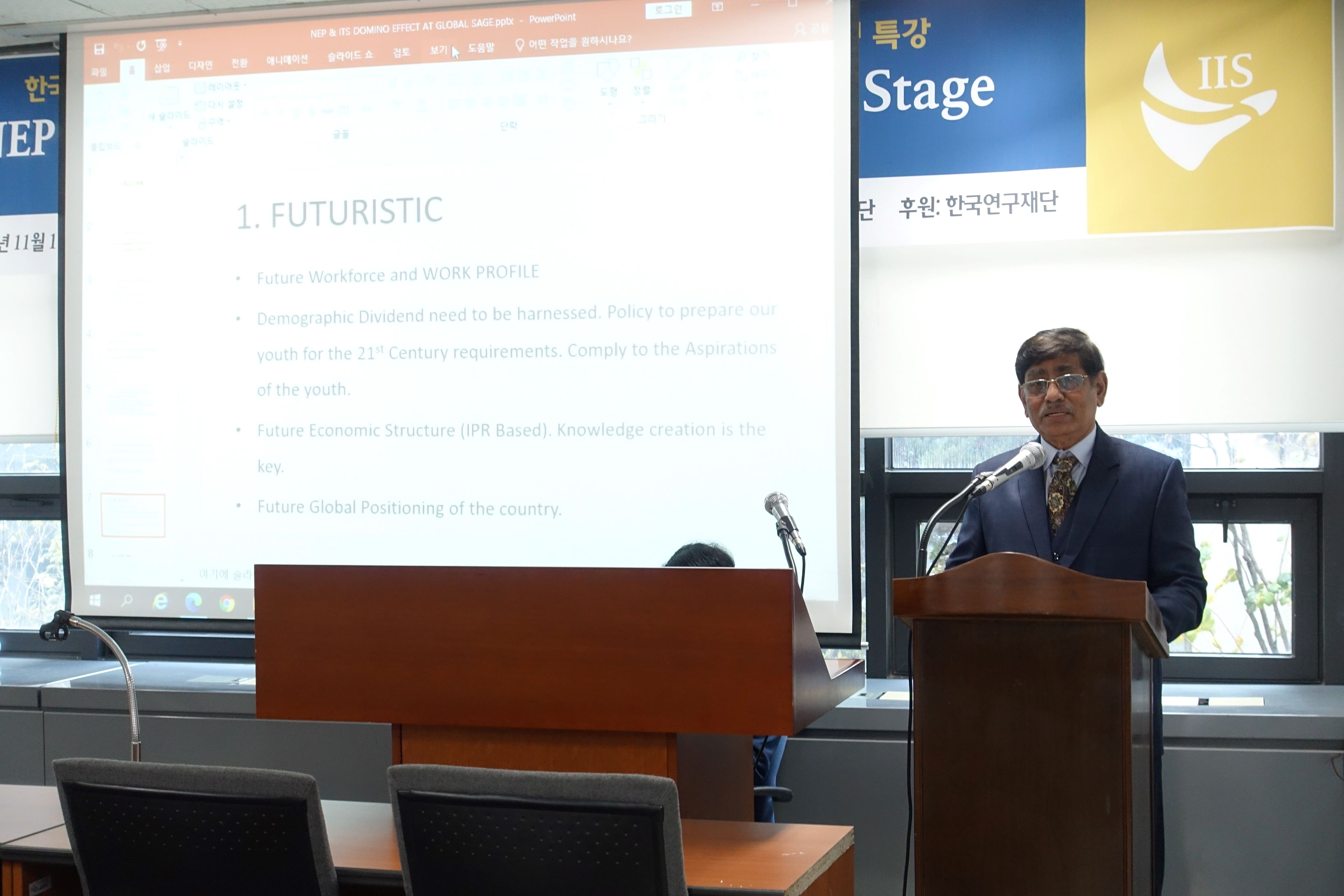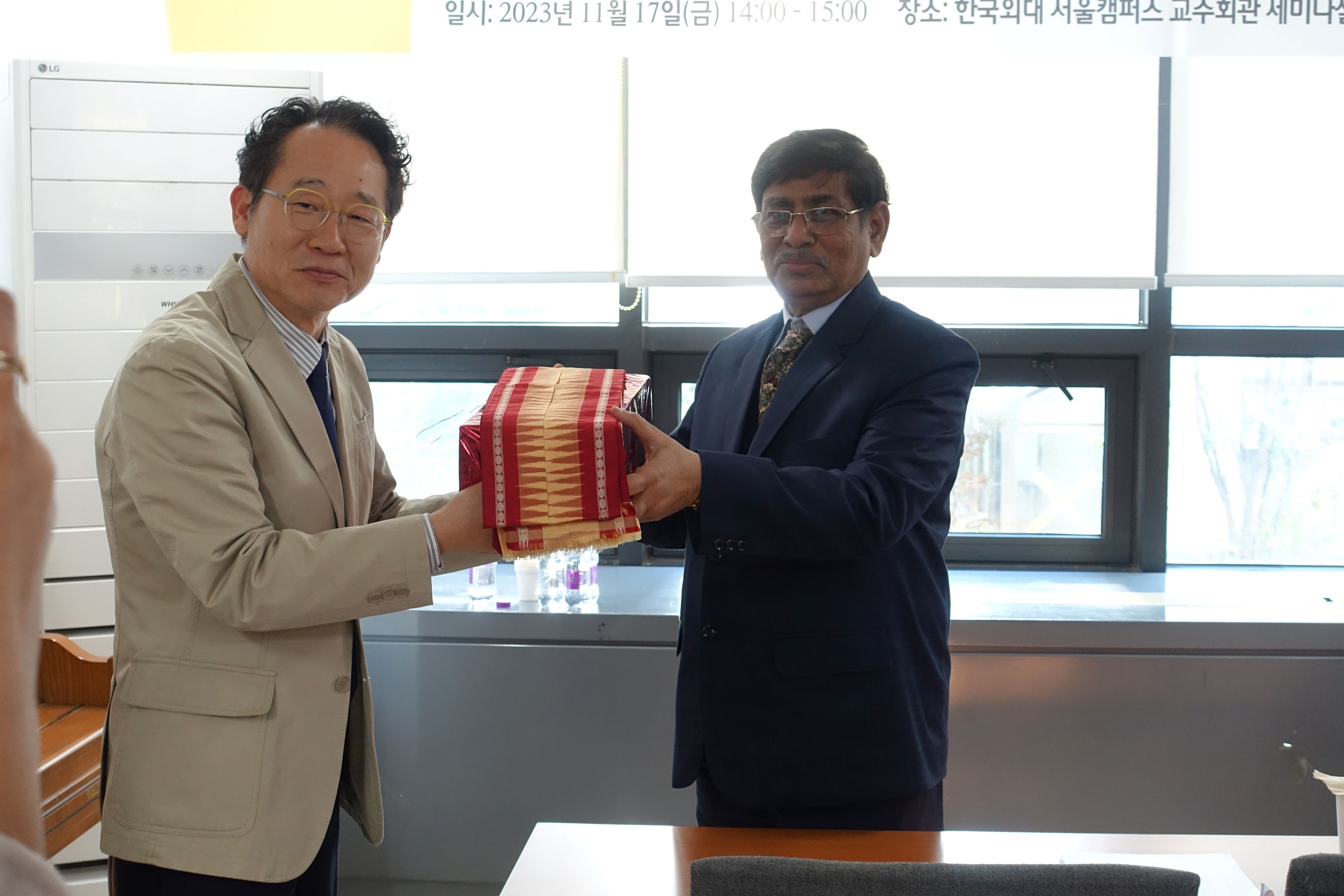- 글번호
- 144979
[Research] The 64th Special Lecture
- 수정일
- 2023.11.28
- Writer
- 인도연구소03
- Count
- 220
- Date
- 2023.11.28


Hankuk University of Foreign Studies Institute of Indian Studies HK+ project team (Director Professor Kim Chanwahn) held the 64th special lecture by Kshiti Bhusan Das on Friday, November 10th. This special lecture was organized in commemoration of the 50th anniversary of Friendship between Korea and India.
The topic of the lecture was "NEP 2020 & its Domino Effect at the Global Stage." India's education system, originally designed by the British during their colonization, was a plan that did not prioritize the Indian people and ignore Indian culture and ethos. Post-independence, India recognized the need for a new education system to wake the potential of its glorious ancient civilization, exceptional human resources, and abundant natural resources. However, the contemporary challenges faced by India include the collapse of socialism, the impact of globalization, and the shift to a market economy.
The National Education Policy 2020 (NEP 2020) is characterized by a democratic process involving all stakeholders, from grassroots to the central government. The speaker discussed the details of NEP 2020.
The new education policy aims to meet the demands of young people in the 21st century by demographically distributing the costs of future oriented education. Additional goals include building a $5 trillion economy by 2025, achieving cultural advancement, inclusivity, self-reliance and responsible citizenship by 2047. To achieve these goals, an additional 250 million workers are required in industries and services by 2030. India has the potential to become a global source of manpower, making it an important investment destination for research and development (R&D).
The vision and challenges for higher education in India were also outlined.
Firstly, the vision includes the following objectives:
- To build a 21st-century model of higher education characterized by accessibility, equity, high quality, and affordability.
- To produce social, economic, and intellectual talents with the highest global standards.
- To foster true global citizens who take pride in their Indian identity.
Achieving this vision requires innovative intervention to excel in competitive environments. This innovative intervention involves an education combining curriculum, co-curricular activities, and technology, along with teaching and learning processes and pedagogical evaluation.
Secondly, the challenges for higher education under the NEP include:
- Achieving the targeted Gross Enrollment Ratio (GER) of 50% by 2030
- Developing intellectuals without degrees
- Fostering young people with sensitivity, human values, and a work ethic
- Preparing the younger generation for global competitiveness
- Attracting and retaining competent faculty members
- Enhancing the quality of academic and sponsored research
Then the speaker proposed the structural changes, including:
(1) Establishing Multidisciplinary Education and Research Universities (MERUs)
- Serving as centers of innovation and knowledge creation
- Implementing research-integrated curricula
- Developing multi-year research universities in collaboration with academic and research fields
- Focusing on multidisciplinary education
- Providing industry-linked courses
- Emphasizing learning outcomes
- Developing graduates who meet the demands of economy
- Producing globally industry-ready graduates
- Fostering entrepreneurial skills and industry leadership on the global stage
(2) Adressing economic needs of the poor
- Establishing foundation organizations to break down poverty
- Utilizing skills-based education to acheive social goals
(3) Aiming for holistic development
- Integrating all human capacities: intellectual, social, aesthetic, emotional, and moral.
- Emphasizing freedom in the choice of courses, technology, science, social sciences, humanities, professional skills, human values and multidisciplinary orientation.
In addition to these foundational content, the speaker also discussed the peripheral impact of India's new education policy on neighboring countries. The lecture, attended by approximately 20 people, provided a valuable and refreshing resource on the recent changes in the Indian education landscape. The speaker, offering insights as both an educator and an administrator actively engaged in Indian education policy, was highly appreciated by the audience.
- 첨부파일
- there is no attach file.

